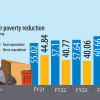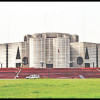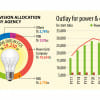Solutions not offered

The proposed budget for 2024-25 lacks creativity and offers no solutions to the many complex challenges facing the country's economy, economists have said.
In their instant reaction yesterday, they also termed the outlay "traditional".
Rizwanul Islam, former special adviser for the employment sector of the International Labour Organization, Geneva, said the budget has been presented at a time when the country's economy is experiencing major challenges like low foreign reserves, high inflation, fluctuating exports, and stagnant remittance inflow through formal channels.
"But one does not see any new thinking and recalibration of the policy approach that was needed to reduce inflation, boost employment and to protect the vulnerable," he said.
According to him, the targets for GDP growth and inflation rate appear to be unrealistic due to the internal inconsistency between GDP growth and restrictive monetary policy, the precarious state of foreign reserve and import compression.
"The goal of reining in inflation through reduction in import duties of some items hinges critically on the transmission of such reduction to the domestic market. Previous record on this does not generate much hope," he added.
Rizwanul said a more realistic approach should have been taken for macroeconomic stabilisation with a lower rate of GDP growth, gradual reduction of the inflation rate, adoption of job creation programmes, and greater support to the poor and vulnerable.
Zahid Hussain, former lead economist of the World Bank's Dhaka office, said the proposed budget has a few positive features, but overall it falls well short of being consistent with the immediate needs and the medium-term challenges facing the economy.
"The domestic borrowing target of Tk 160,900 crore will exacerbate pressure on the taka and dollar liquidity in the banking system and hinder the possibility of achieving the ambitious 6.75 percent GDP growth target. Nor will it help soften inflation," he said.
Fahmida Khatun, executive director at the Centre for Policy Dialogue, said changes in the tax rates seem positive.
"But 2.5 percent of the budget shortfall will come from bank loans. In that case, it will be more difficult for businessmen to get bank loans."
In her opinion, the medium-term macroeconomic indicators given in the budget are not realistic. The targets for GDP, investment, inflation, and foreign exchange do not reflect the reality. These are attempts to meet IMF targets.
"Overall, given the challenges against which the budget was announced, we expected this budget to be quite innovative, creative and bold, but it did not happen. A traditional budget cannot provide any solutions in challenging times," she said.
M Masrur Reaz, chairman of Policy Exchange of Bangladesh, said the highest priority of the budget should be stabilisation of the macroeconomic challenges. From that perspective, the size of the budget is okay. But at a time when inflationary pressure is already biting both citizens and businesses hard, increase in tax rates is not the right step.
"Increasing tax rate does not allow or does not often lead to increase in revenue. Rather, increasing tax base, addressing leakage, reducing tax expenditure, finding new sources of tax are required to increase tax revenue. But we don't see that effort," he added.
Salehuddin Ahmed, former governor of Bangladesh Bank, said there are three major challenges right now -- inflation, shrinking foreign reserves, and energy crisis.
"These three challenges are affecting our overall economy. As a result, the macroeconomy is very unstable. In this scenario, I think the size of the budget is realistic. But whatever the size, I have some questions about government spending."
The budget deficit is huge, which means the cost should have been reduced, he said.
"For example, what is the need for 1,258 projects under the Annual Development Programme? If the Annual Development Programme is cut down, the deficit will come down."
He said 40 percent of the budget will be spent for the administration. Besides, after spending on other less important sectors, it will be seen that there is no money for development.
BUSINESSES' REACTION
According to a number of businesspersons, considering the various global and domestic economic challenges, the proposed budget is time-befitting.
"In particular, the size of the budget is limited to Tk 7.97 lakh crore. The rate at which the budget has seen an increasing trend in the past few years has not been observed this time. This may give some relief to the taxpayers," said Asif Ibrahim, chairman of Chittagong Stock Exchange PLC.
He also said the revenue collection target (Tk 5.41 lakh crore) may be somewhat challenging due to the current macroeconomic crisis.
"The inflation control target has been fixed at 6.5 percent. But considering the current global economic situation, how inflation will be brought down from 9.30 percent is still not clear in the budget framework," he said.
FBCCI President Mahbubul Alam said the budget is realistic and implementable.
However, he called on the government to fix the personal tax limit at Tk 4.5 lakh instead of Tk 3.5 lakh.
Ashraf Ahmed, president, Dhaka Chamber of Commerce and Industry, said the government has tried to increase the revenue collection. "Import duty on almost 30 essential products has been reduced, which is a good move."
He also hailed the government's bank borrowing target which, although still high, is almost 11.82 percent lower than the last fiscal.
Abdul Matlub Ahmad, former president of FBCCI, said there is no clear message in the budget to reduce the price of essentials to give relief to the common people from the inflationary pressure.
He stressed the need for subsidy on essential products, which is absent in the proposed budget.
Humayun Rashid, president of the International Business Forum of Bangladesh (IBFB), said the proposed budget does not address the high cost of doing business amid shortage of dollar due to shirking forex reserve.
Syed Ershad Ahmed, president, American Chamber of Commerce in Bangladesh (AmCham), stressed the need for revising individuals' tax-free income limit to provide a cushion against the rising inflation.


 For all latest news, follow The Daily Star's Google News channel.
For all latest news, follow The Daily Star's Google News channel. 










Comments